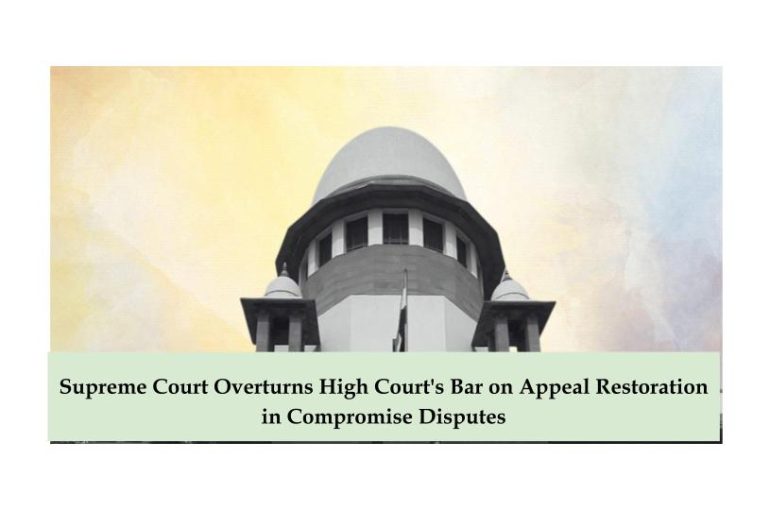Supreme Court Overturns High Court’s Bar on Appeal Restoration in Compromise Disputes
On December 12, 2024, the Supreme Court of India delivered an important judgment in Navratan Lal Sharma v. Radha Mohan Sharma & Ors., 2024 INSC 970, concerning the restoration of appeals following a compromise decree. The decision clarifies critical aspects of Order 23, Rules 3 and 3A[1] of the Code of Civil Procedure (CPC).
Background of the Case
The Appellant, Navratan Lal Sharma, initially filed a suit seeking the cancellation of certain documents related to his property, including sale deeds and a power of attorney, which he claimed had been forged by the Respondents. The Trial Court dismissed the suit, leading the Appellant to file a First Appeal before the Rajasthan High Court.
During the pendency of the Appeal, the parties reached a compromise agreement. The Compromise Deed, dated May 18, 2022, outlined specific financial arrangements and other terms between the Appellant and Respondent No. 2. The Rajasthan High Court, on July 14, 2022, disposed of the Appeal based on this compromise, recording the terms and making them part of its order. However, the High Court did not grant liberty for the Appeal to be restored if the terms of the compromise were not adhered to.
When the cheques issued as part of the compromise were dishonoured and the Respondents failed to comply with the agreed terms, the Appellant moved the High Court seeking restoration of the Appeal. The High Court dismissed the restoration application, citing that its order from July 2022 explicitly stated that no liberty for restoration had been granted.
The Legal Issue
The core legal question before the Supreme Court was whether the High Court could deny the Appellant the right to seek restoration of the Appeal despite the violation of the terms of the compromise. The Appellant argued that the High Court’s refusal to grant liberty for restoration of the Appeal was erroneous, as such a right exists under the CPC.
Court’s Analysis
The Supreme Court began by examining Order 23, Rules 3 and 3A of the CPC, which govern the compromise and disposal of suits. Rule 3 allows a suit to be disposed of in accordance with a compromise reached between the parties, and Rule 3A bars any suit to set aside a decree based on an unlawful compromise.
The Court referred to previous judgments, including Banwari Lal v. Chando Devi (1993), where it was held that a court must be satisfied that a compromise is lawful before recording it. If a compromise is alleged to be fraudulent or illegal, the affected party can challenge its validity. The Pushpa Devi Bhagat v. Rajinder Singh (2006) case clarified that the remedy for a party aggrieved by a compromise decree is not through Appeal or fresh suit, but by moving the same court under the proviso to Order 23, Rule 3 to examine the legality of the compromise.
In this case, the Appellant alleged fraud and non-compliance with the terms of the compromise, which, if proven, would render the agreement voidable under the Indian Contract Act, 1872. The Court held that the High Court erred in dismissing the restoration application merely because it had not granted explicit liberty for restoration in its previous order. The Court emphasized that a statutory right to seek restoration exists, and it could not be waived by the court through its order.
Key Points of the Judgment
- Statutory Right to Restoration: The Supreme Court reiterated that when a party is aggrieved by the non-compliance of a compromise decree, restoration is the statutory remedy under Order 23, Rule 3 of the CPC. The court cannot preclude a party from availing this remedy, as it remains open unless explicitly barred by law.
- Court’s Duty to Examine Legality: The Court emphasized that when a compromise is recorded, the court must ensure that the agreement is lawful. If a party challenges the validity of the compromise (e.g., alleging fraud), the court has a duty to examine the matter, even after the compromise decree has been passed.
- Role of Public Policy: The Court highlighted that agreements restraining a party from accessing legal remedies are void under Section 28 of the Indian Contract Act, reinforcing the public policy that a party should not be deprived of statutory remedies.
- Compromise Deed Clauses: The Court also pointed to specific clauses in the compromise deed itself, which recognized the Appellant’s right to seek restoration of the Appeal if the terms were violated. This clause was in line with the statutory provisions, further supporting the Appellant’s position.
- High Court’s Error: The Supreme Court found the High Court’s refusal to allow restoration on the grounds that it had not granted liberty to restore the Appeal was a misapplication of the law. It held that when statutory remedies are available, courts cannot deny access to them, even if the parties agreed otherwise in a compromise.
Conclusion and Relief
The Supreme Court allowed the Appeal, set aside the High Court’s order dismissing the restoration application, and remanded the matter to the High Court to decide the restoration application on its merits. The Court emphasized that it had not expressed any opinion on the merits of the dispute itself but had only upheld the statutory right of the Appellant to seek restoration of the Appeal in case of non-compliance with the compromise terms.
This judgment clarifies the statutory rights of parties under the CPC when it comes to restoring Appeals disposed of by a compromise decree, especially when allegations of fraud or non-compliance are raised. The decision strengthens the principle that access to justice cannot be undermined by a consensual order that precludes a party from availing of lawful remedies.
Shikha Pandey
Associate
The Indian Lawyer & Allied Services
[1]https://www.algindia.com/wp-content/uploads/2021/11/Hardik_CPC-Order-XXIII-Rule-3-Different-Types-of-Compromises-in-Different-Types-of-IP-Lawsuits.pdf





































Leave a Reply